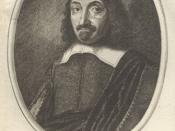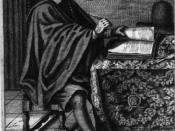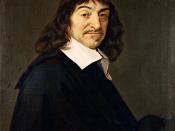Discourse, Part Four, par. 5
In this short passage from René Descartes' Discourse on Method, he seeks to draw comparisons between concepts in the field of geometry and the existence of an all-perfect being or God in the world. After going through various geometers' mathematical demonstrations, he sees the certainty with which mathematical facts can be proven. He notices in the example of a geometric triangle, that even though one can prove certain details about the triangle's angles, the actual existence of the triangle in the world is not assured. There are established details that make up the spirit of a triangle, such that its angles add up to 180 degrees, and these are essential. Descartes says the comparison can be made between this concept and the essentiality of existence as a property of God. The existence of God is therefore as certain as a mathematical verification. The main difficulty with people grasping God's existence is that it must be done with reason.
We cannot rely upon our imagination or our senses because they are deceiving and uncertain. Due to most aspects of life relying on these facets, Descartes argues that God's existence is actually more certain than all else.
If we step back and look at this section of the work from a modern perspective, it reflects the opposite point of view that most people have today. Descartes makes multiple points as to how mathematics is fallible and dubious, but in the 21st century very few would agree with this point. In a very technologically based society, mathematics is held with utmost respect and factual certainty. It's because of incredible advances in this field, as well as other sciences, that we live with such ease and comfort today. Nothing seems more "existent" than being able to truly...


